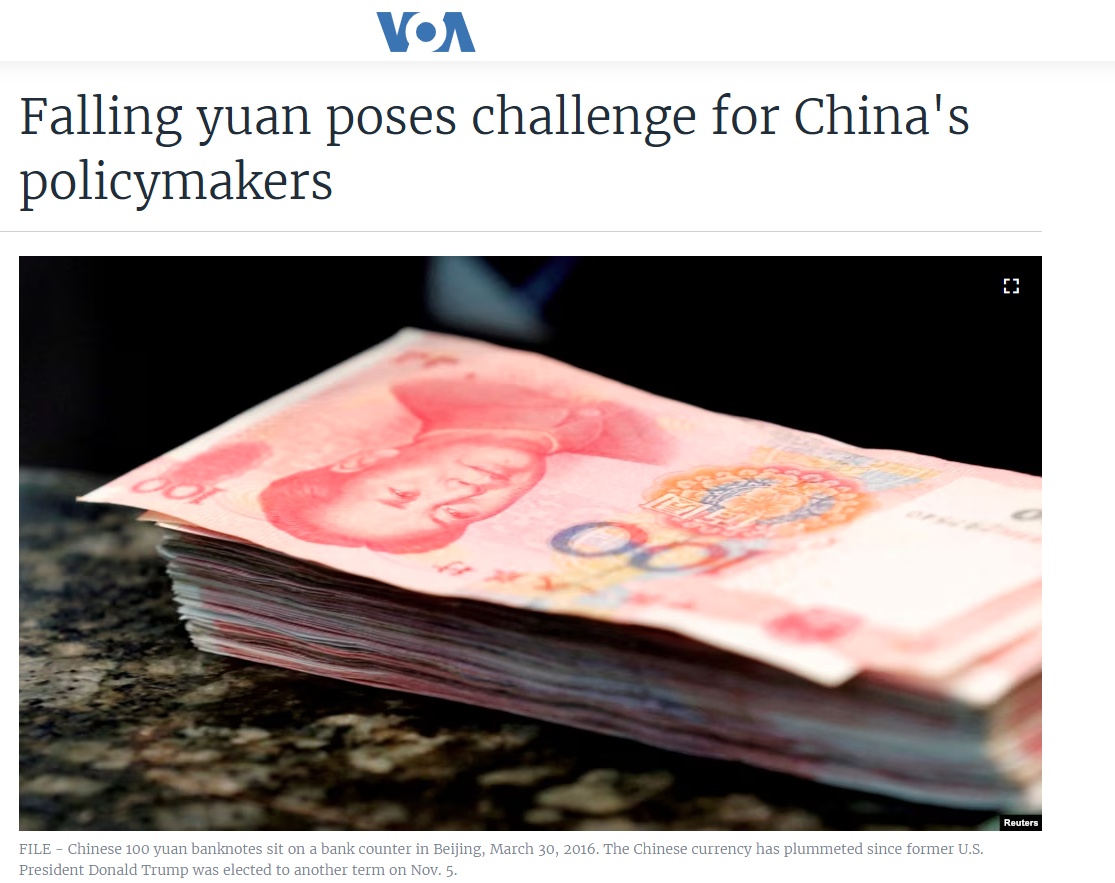LATEST INSIGHTS
Your Present Location: LATEST INSIGHTSWang Wen: Falling yuan poses challenge for China's policymakers
Source: VOA Published: 2024-11-19

The Chinese yuan has plummeted since U.S. President-elect Donald Trump's victory, and finance experts are questioning why the Chinese government is not doing more to defend the currency.
"The slide in the yuan's value reflects the negative expectations of the world towards China-U.S. relations after the recent victory of Donald Trump, as well as some misperception in the international market towards China's growth," Wang Wen, dean of Renmin University's Chongyang Institute for Financial Studies, told VOA.
The yuan, or renminbi, has been slipping against the U.S. dollar since well before the U.S. election on November 5, dropping more than 3% against the dollar in a seven-week losing streak, Reuters reported on November 15.
Will the yuan continue to slide until early 2025 when the Trump administration takes charge?
The Chinese currency closed Tuesday at 7.23 to a U.S. dollar, compared to 7.09 to a dollar on U.S. Election Day.
"There's been a broad strengthening of the dollar over the past few weeks which is in part a response to Donald Trump's election victory but also to stronger U.S. economic data," said Mark Williams, chief Asia economist at London-based Capital Economics. "Both developments have led investors to pare back expectations for rate cuts by the U.S. Federal Reserve."
Export strategy
Some economists believe that Beijing deliberately allowed its currency to slide to enhance China's export prospects. Trump has promised to impose a 60% tariff on all Chinese goods.
"A weaker currency also acts as a safety valve, offsetting the impact of the tariff by making the country's exports cheaper," Williams said.
China's policymakers are sitting on the world's biggest reserve at $3.26 trillion, according to the state-run Global Times. Though this offers a strong cushion against shocks, Beijing prefers not to spend much of it to defend the yuan.
"The PBoC [Bank of China] will not wish to burn through its foreign reserves in a doomed effort to keep the RMB at current levels," said Benn Steil, a senior fellow and director of international economics at the Council on Foreign Relations.
"The PBoC can slow RMB depreciation, but market pressure will eventually win out — if not in the coming weeks, in the coming months," Steil said.
Trump's plans to impose massive tariffs will keep U.S. interest rates higher, and in turn, reduce U.S. demand for foreign currency to pay for imports, Steil said.
"Both of these effects will act to push up the value of the dollar and push down the value of the currencies of U.S. trade partners, in particular China," he said.
But Wang of Renmin University said the yuan would absorb the initial shock and begin to rise after next year.
"At present, the competition between China and the United States has reached a critical period. But China will not lose in the longer term and the yuan will begin to appreciate," he said, adding, "Time is on China's side."
The biggest risk for China is an accelerating capital flight — unrecorded outflows from Chinese residents as they lose confidence in the domestic economy, Steil pointed out.
"This will hurt China's ambition of boosting household domestic consumption, which is the only way to stabilize the Chinese economy in the medium term," he said.
Risk of declining yuan
A weak yuan will also reduce confidence in the Chinese economy among foreign investors while hampering Beijing's long-standing effort to internationalize its currency.
Goldman Sachs said it expects China's exports to fall 0.9% next year in nominal dollar terms, mostly because of higher tariffs, according to Reuters.
"The tariff impacts should, however, be partially offset by domestic easing and currency depreciation," Goldman said. It expects the yuan to weaken to 7.50 per dollar by the end of 2025.
Key Words: Wang Wen, RDCY, Yuan, China























































































 京公网安备 11010802037854号
京公网安备 11010802037854号





